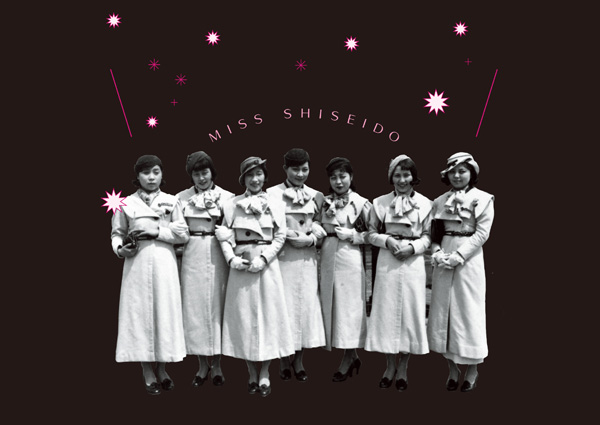
80 years ago in 1934, the inaugural "Miss Shiseidos" debuted. Miss Shiseidos were predecessors of "Beauty Consultants", who provide beauty counseling to customers at Shiseido counters. In Origin of Beauty (P16-19) in the "Hanatsubaki Magazine", writer Madoka Yamasaki, who is familiar with girls' culture, talked about "Miss Shiseidos".
"Miss Shiseidos" were icons for women at the time.
Ms. Yamasaki and I were able to interview Ms. Noriko Shibue, who was one of the "Miss Shiseidos".
Ms. Shibue was active as the "9th generation Miss Shiseido" for only 2 years from 1958. The "Miss Shiseido" system was discontinued with the 10th generation in the following year. 1958 was over 50 years ago now. I was excited to meet her, wondering what she would be like.
I finally met Ms. Shibue for the first time in the Shiseido HQ in Ginza. She is a graceful woman with a straight back. I wondered what the origin of her beauty was. Everything Ms. Shibue said was interesting, but I especially felt that it was "Miss Shiseido" education that created Ms. Shibue’s beauty, which is unchanged regardless of her age.
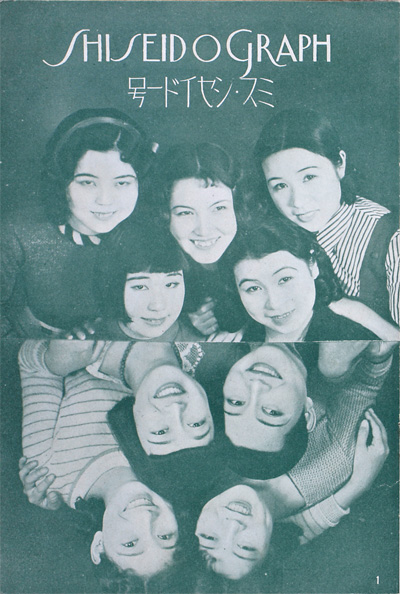
From "Shiseido Graph" 1934 Volume 8.
Becoming "Miss Shiseidos" was extremely competitive and people had to pass a number of examinations, but she said that they received thorough education even after they became Miss Shiseidos. She said that it made her very happy that she was able to learn etiquette/manners from Ms. Aki Fujiwara.
"Ms. Aki Fujiwara was the wife of Mr. Yoshie Fujiwara, who was the head of Japan's first full-scale opera group 'Fujiwara Opera'. She was also the manager of the beauty department in Shiseido. She was a regular in "Watashi no himitsu (my secret)", which was a popular NHK program at the time. Her kimono, which she changed every week, became very popular, and she was so lovely that there was a legend that the female half of public bath houses became empty during the program. Although I didn't even wonder at the time, I thought about it later and wondered why Ms. Aki Fujiwara was the manager of the beauty department despite the fact that beauty was not her specialty. When I looked into it, she was born as the third daughter of Hikojiro Nakamigawa, who established the foundation of the Mitsui Zaibatsu (conglomerate). She graduated from Gakushuin and was apparently a master of all types of Japanese traditional cultures. After that, she fell in love with Mr. Yoshie Fujiwara, followed him to Europe, and was a star of society circles in Europe and the U.S. for 20 years after that. She returned to Japan alone when she was in her mid-50s and was active on TV, etc. I think that Shiseido probably recruited her as the manager of the beauty department in order for her to embody richness, refinement, and elegance, which are Shiseido’s images, since she was a master of both Japanese and Western traditional cultures and manners.
Ms. Aki Fujiwara's story about 'weight of words' especially left a strong impression on me. Back then, Shiseido would invite female owners and male owners of business partners to hold study sessions called "Chain Store Seminar" at Imperial Hotel and other various hotels. And Ms. Aki Fujiwara participated in these seminars, needless to say. She said that a lady in kimono approached her one day at a party venue, saying 'Do you remember?' Ms. Fujiwara said that the lady went on to say 'You said that this obi was lovely in the seminar last year. At the time, I hadn't matched my kimono to the obi. So I newly ordered everything from kimono to bag afterwards'. Ms. Fujiwara said 'I think that the lady remembered the words 'it is lovely' because it was me who said it'. Ms. Fujiwara also said 'So, words have different weights depending on who said them' and 'Weight of words is not something you can instantly acquire, but you only become attractive after others recognize you to be lovely. Attraction means to attract hearts, so it is only when you feel this attraction from others that the same words speak to your heart.' Her talk went on to discuss what we needed to do in order to achieve this, and she told us a story about words by Zeami, 'flower of time' and 'flower of truth'. Since these words are from Noh (classical Japanese musical drama), I think the original meanings were slightly different. But the story was about the fact that beauty in youth is something that everyone has but true beauty is something that you can only gain after accumulating various things like efforts, etc. When I did some research later, I found out that Ms. Aki was 62 years old at the time. She was the same age as my mother, and 62 years old at the time was different from what it is now. But she was so lovely. When she told us this story, she also told us that 'Elegance' is the best compliment in Europe'. She said 'You would never say [elegant baby], do you? Elegance is something you acquire through efforts, and it is the embodiment of the person's daily accumulations surfacing as her attraction'. She said 'It is the first impression, voice, and words. Etiquette/manners are just part of it. And it's not that you stick to textbooks. You must be able to arrange it according to the time and place and bring pleasant atmosphere to wherever you are.' She went on to say 'So, none of what you will learn here is something you should consider [I have learned. And I understood.] I want you to acquire them instead of understand them. A number of classes will start again tomorrow, but they are all something that will become useful only after you acquire them and not as knowledge'. She also said 'You are rough stones. You will shine if you polish yourselves, but you are not the same stone. Each of you are different. You may be a diamond, ruby, or sapphire. These are each person's characteristics, so utilize them and polish them. Drives may be handed to you, but you are the ones that have to polish yourselves. No one else would do it for you. They may teach you, but you are the ones who will execute what you have been taught. So you must continue polishing yourselves.'"
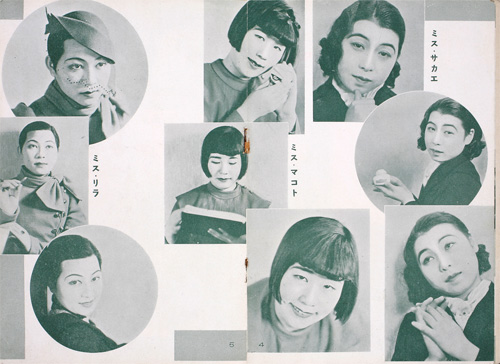
From "Shiseido Graph" 1934 Volume 8.
…These are deep words. It sounds so exciting to be taught etiquette/manners by someone who was familiar with both Japanese and Europe cultures at the time and was active on TV, being called a "noble lady".
Ms. Shibue also told us about the interesting education.
"They told us that we are the representatives of Shiseido, because we are Shiseido in the eyes of customers. So we were thoroughly educated and taught by the top class people within and outside of the company. Teachers included not only factory managers and directors of the research center in Shiseido but also etiquette/manners by Ms. Aki Fujiwara, speech by Mr. Keizo Takahashi from NHK at the time, art and aesthetics by Mr. Masaaki Nishida of the Tokyo University of the Arts, and nutrition by Ms. Aya Kagawa of Junior College of Kagawa Nutrition University, etc. We also learned manners of Japanese cuisine by going to top class Japanese restaurants and manners of Western cuisine at Shiseido Parlour in order to learn authenticity. Waiters came over and served everything even for lunch. Also, when I joined Shiseido in 1958, the expression 'eight-heads-tall beautiful woman' was popular. Overall healthy beauty was attracting attention after Kinuko Ito was chosen number 2 as the Japanese representative of 'Miss Universe' 5 years before. In such time, Miss Shiseidos demonstrated 'Beauty Exercise by Shiseido', which was easy for anyone to remember, in Hanatsubaki Club gatherings in order to promote the exercise among regular users. Under the instructions of a lecturer at Nippon Sport Science University, we practiced in tights in a mirrored hall like ballerinas. Our seniors joined us to practice afterwards, but I longed to be closer to the beauty of their proportions and movements as soon as possible."
You truly acquired knowledge from a wide variety of genres.
"Another thing that left a strong impression on me was a story by Professor Nishida of the Tokyo University of the Arts. He was already quite an elderly man at the time, but he told us about 'beauty of flowers, beauty of leaves, and beauty of fallen leaves'. Even one or two year-old children can understand that flowers are pretty. Children also start to understand beauty of leaves when they are around elementary school - for example, they can understand that shiny young leaves in rain are pretty. 'But usually, that is as far as you go unless you train yourself', he said. In other words, beauty of fallen leaves is something that you will only understand after you train yourself. Without it, you just go as far as 'Oh, they have fallen'. He said it's kind of like 'Furuike ya kawazu tobikomu mizu no oto' ('the sound of a frog jumping into an old pond'- famous haiku by Basho Matsuo ). He said that there is an ancient aesthetic sense in Japan like that - he used the expression 'beauty of refined simplicity' and said that he wanted us to be very familiar with the culture that is unique to Japan. He told us to visit galleries and museums to look at many good arts because there are many in Ginza and Ueno. He kept giving us tickets even outside of class if there were exhibitions, etc. He also said that seasons were at the foundation of the ancient aesthetic sense in Japan. Japanese cuisine, kimono, and Japanese houses that made a full use of seasons - we use different fixtures according to seasons, such as bamboo screens and thatched doors in summer and shoji and fusuma, etc. in winter. The same can be said about literature. 'The Tale of Genji' excels at seasonal descriptions and even compares women's beauty and characteristics with seasons. Haiku, which is a short poetry form unique to Japan, cannot be written without seasons. Since he was an elderly man, he told us many things from his own experiences. He even told us to read such and such books, etc."
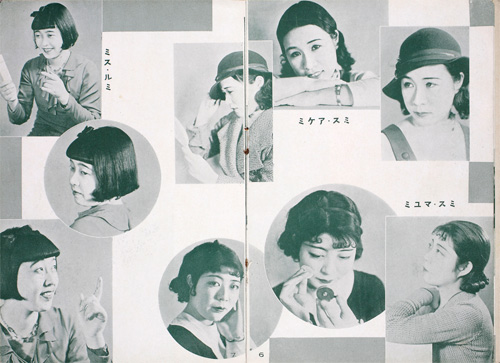
From "Shiseido Graph" 1934 Volume 8.
Ms. Shibue told us that they also learned a lot about beauty, needless to say. We asked what left an especially strong impression on her.
"The professor from the Nutrition University taught us 'human bodies are made from food'. Although this is a natural concept, she taught us about what we now call 'well-balanced meals', etc. This is based on the premise that beauty is achieved on a healthy body and cannot be achieved only through cosmetics. I still find her lectures about food truly useful to this day. We also learned about dermatology. Dr. Kobori, who was the head of dermatology in Tokyo Teishin Hospital, taught us 'Just looking at skin tells us the person's age, health condition, and even mental condition. Skin is the mirror of mind and body'. Skincare was also an important point. We have to keep it clean, and moisturize it. We have to always keep skin surface moist. We must also avoid external damage, such as UV rays and dryness. He said that we always had to follow these 3 points. He said that our skin would function well as long as we thoroughly followed these steps. He said that cosmetics, unlike medicines, have no harmful effect or side effect but do not show the effect immediately after starting to use them and that we can only tell if they are working after we continue to use them. He told us that the most common skin trouble among young women was that they ruin their skin because they try too many cosmetics, thinking 'This didn't work' and 'That didn't work'. He said that another pattern is that they massage with too much force because they are trying too hard, creating dark spots along the fingers' paths. He told us 'So they should not be done in a hurry. They gradually work, so we must correctly choose them and correctly use them. And the important thing is that you continue using them’. So the key is how to maintain your true skin - the skin that you were born with. Even if you aim too high, the person is the way she is. I feel like people lack the process of replacing their aim with themselves now. I'm talking about knowing oneself. This can be said about fashion and everything else. Even with nutrition, you can't instantly become beautiful because you eat something. We have seen food, which was introduced on TV, being sold out at supermarkets, but we should really eat such food every day in a natural manner. In addition, I try to avoid medicines as much as possible even when I catch a cold, because medicines have side effects. I rid myself of the cold with food, sleep, and gargling. Now that I think about it, I feel that I have been imprinted with all of these things. The same can be said about exercising. The basic idea is to have a proper posture first, and walk correctly. I also did Beauty Exercise by Shiseido in order to thoroughly move my body. Now, I have been continuing the radio exercise for a long time. Thanks to that, nothing in my body hurts despite my age."
I thought that the secret for her ever-lasting beauty is that she continues daily small care. It seems like a natural concept, but it's very important.
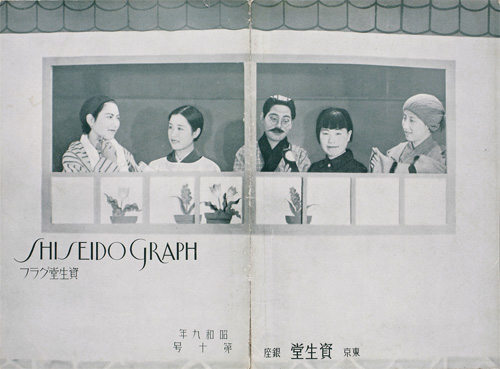
From "Shiseido Graph" 1934 Volume 10. A scene from "Shiseido Theater of Modern Beauty" filled with Shiseido's beauty methods.
Ms. Shibue also shared an interesting story from her business trips.
"Our main work at the time was visiting local areas. Our train was first class. They specified the top class ryokans and hotels of the area. Ms. Aki Fujiwara also said 'Go to the nicest restaurant and cafe in town. You can order the cheapest thing, but go to the best place.' I think we learned that people are refined by being seen by others by visiting top class places.
My senior colleague, with whom I was assigned the room on my first business trip, taught us everything from work to daily lives in detail, such as how to greet executives and managers of sales companies who came to stations and how to hand out business cards, etc. She also taught me to always be aware of the eyes of serving ladies in ryokans, because they can be our customers when our positions were different. For example, she taught me how to enter and leave the room, to hide my underwear with a handkerchief when we are drying it, to clean up after my bedding, and to keep the room tidy. Even when I took a bath, I was taught that junior colleagues were to wash themselves closer to the drain and to make sure that water does not spatter on others when we leave the tub, etc. She taught us everything, including what I didn't even learn at home, in so much detail."
I felt that her activities as a Miss Shiseido, despite the fact she was only active for 2 years, greatly affected Ms. Shibue's life afterward.
She said "They drove what truly coincides with the core of my aesthetic sense into my brain in 2 years, so that is not something I lose".
Ms. Shibue said that she always tries to be conscious about the words "independence and self-respect" by Jane Fonda. She said Jane Fonda and Ms. Shibue are the same age.
"'Independence and self-respect' means to do as you will without being affected by anyone. Even if you fail, you don't get down. You always encourage yourself and are able to love yourself. I thought these were the words. I have kept journals for 40 years, and I have written many things. But these are the words that I always continued to write."
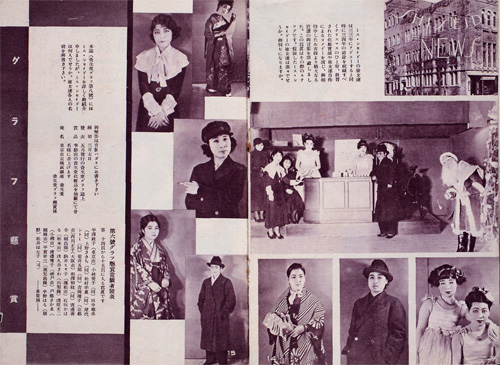
From "Shiseido Graph" 1934 Volume 9.
She also told us something like this.
"This is something I tell myself, but I discipline myself today for tomorrow. Even if I want to watch TV until late, I think I would just go downhill unless I take good care of my sleep and diet, considering my age. So I discipline myself. Although the expression may be different, I think all top class people discipline themselves in such ways. So, when it comes to food, even if I want to eat something, I would make myself only eat one mochi even though I love them. I also love cakes, but I immediately brush my teeth after I have one after meal and refrain myself from eating between meals. But I eat everything when I go on trips like everyone else, and I live like a little bird when I come home. I weigh myself every morning and night. I think I'm 1.5kg heavier now than when I was 20 years old. All of the weight is on my lower half of the body."
She has only gained 1.5kg since 20 years old…Everyone in the room cheered, "That's amazing!" And to discipline oneself without straining oneself…This is a natural concept, but it's not easy for everyone to do. But she continues to do so. I truly understood that this is why she is still lovely and radiates with beauty even after 70 years old.
